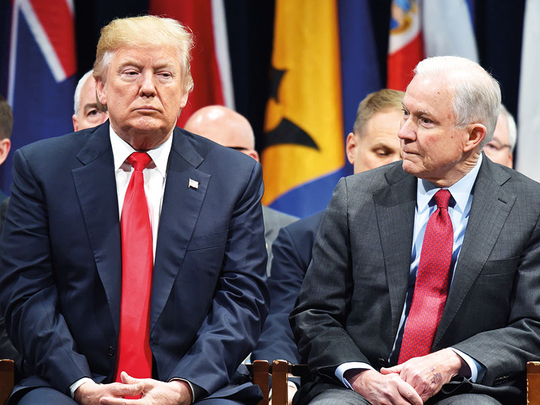
Washington: President Donald Trump excoriated on Wednesday his attorney general, the FBI, the special counsel and members of the intelligence community — citing conspiracy theories by conservatives even as he declared in a wide-ranging interview that he is “not a conspiratorial person.”
Trump used the Oval Office interview with The Hill newspaper to unleash some of his most deeply felt grievances against his critics, saying one of the “crowning achievements” of his presidency will be exposing what he calls corruption among the people investigating his administration.
“We have tremendous support, by the way, to expose something that is truly a cancer in our country,” the president said of federal law enforcement officials without citing evidence. The remark was a striking rhetorical echo of 1973, when John Dean, the White House counsel, gravely told President Richard M. Nixon that the Watergate scandal was “a cancer within — close to the presidency.”
By contrast, Trump compared his repeated trashing of FBI investigators to congressional passage of tax cuts and the elimination of regulations by his administration, saying that “what we’ve done is a great service to the country, really.”
The president’s antipathy toward the intelligence community and the Justice Department has been clear for most of his time in the White House. But Trump’s verbal assault on his own law enforcement agencies during Tuesday’s interview was remarkable even by his standards.
Trump made false assertions about the origins of the Russia investigation and the political make-up of its investigators, citing stories from Fox News personalities: “the great Lou Dobbs, the great Sean Hannity, the wonderful, great Jeanine Pirro.”
The president escalated his drawn-out war with Attorney General Jeff Sessions over Trump’s assertion that Sessions had failed to protect him from the federal investigation into Russia’s interference in the 2016 presidential election and whether any Trump associates conspired with it.
“I don’t have an attorney general,” Trump declared — an extraordinary statement even for a president who has already called his attorney general weak and disloyal. “It’s very sad,” he continued.
(On Wednesday morning, Trump all but reversed himself. “We have an attorney general,” he said, in response to reporters’ questions as he departed the White House to visit storm-struck North Carolina. “I’m disappointed in the attorney general for many reasons.”)
Trump also continued his barrage against Robert Mueller, the special counsel in the Russia investigation. He said Mueller was conducting a “fraudulent” inquiry and was “totally conflicted” because of what the president called a “nasty business transaction” between himself and Mueller years ago.
Trump did not say what the transaction was, though he has alleged a dispute over membership fees when Mueller left one of Trump’s golf clubs while he was FBI director.
And he indicated that he asked this week for the declassification of court documents, FBI records and text messages in the Russia inquiry at the urging of members of Congress and “commentators that I respect” on cable news broadcasts.
“I have had many people ask me to release them. Not that I didn’t like the idea, but I wanted to wait. I wanted to see what, you know, where it was all going,” Trump said.
Law enforcement and intelligence officials must still vet the declassified materials and redact sensitive information. Declassified court documents and materials released to the public under the Freedom of Information Act often have redactions.
The review of this latest declassification order is being given top priority because the request came from Trump, officials said. It is still under way and is primarily concerned with protecting sources and methods, a key concern of senior intelligence leaders, according to two officials briefed on the matter.
Should Trump reject the recommendations of the intelligence community, it could put Justice Department and FBI officials into the uncomfortable position of having to oppose an action taken by the president or to reveal information they believe undermines national security.
The president reserved some of his harshest words for Sessions. Asked by reporters on Wednesday whether he planned to fire the attorney general, the president said, “We are looking at lots of different things.”
Through an extended barrage of humiliating statements and jabs, Trump has made clear that Sessions’ job is in peril. At one point, Sessions, one of the president’s earliest prominent supporters, drafted a resignation letter.












